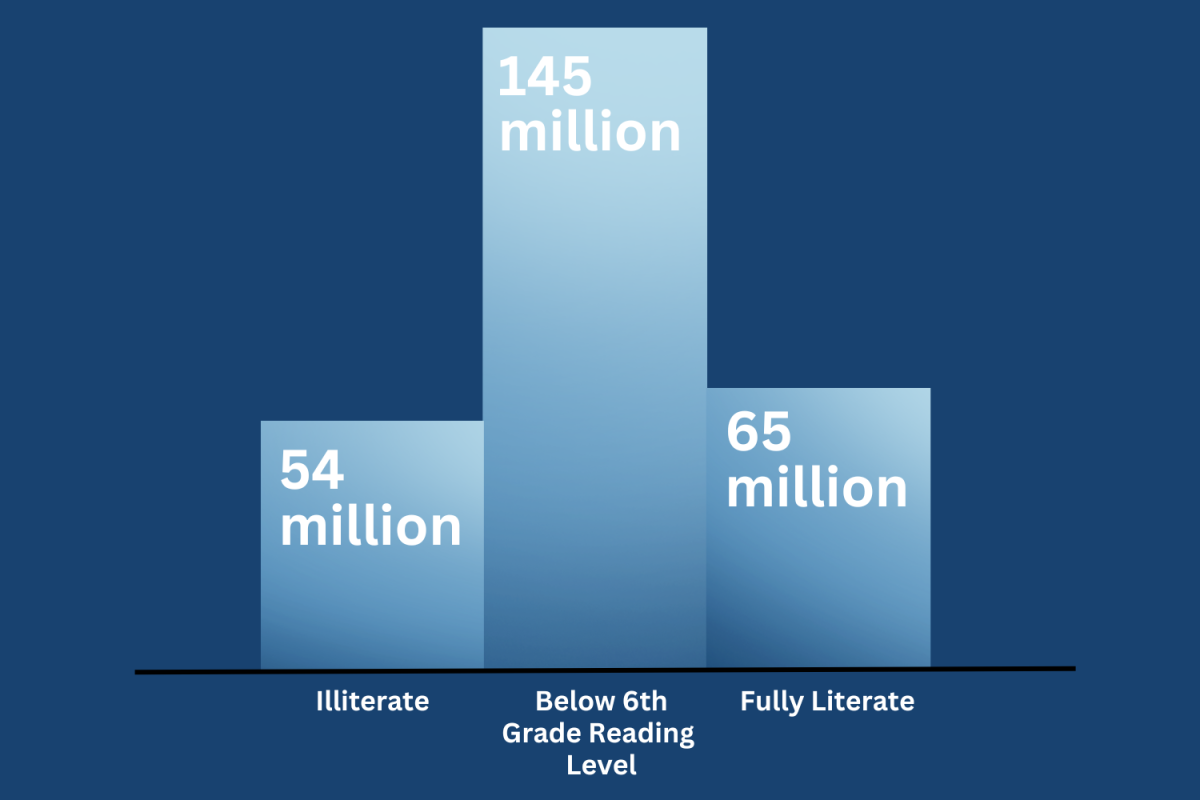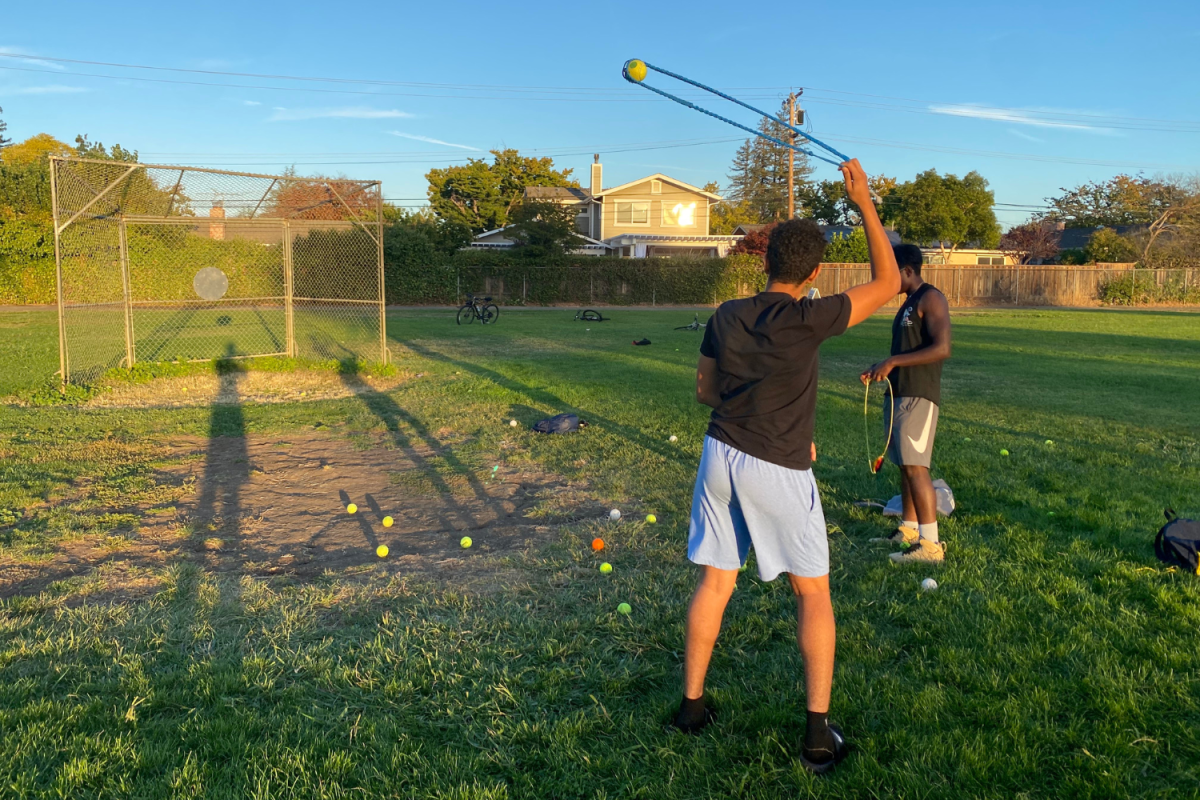A common memory for many individuals is learning the alphabet in kindergarten — starting with a foundation of 26 letters, students eventually grow their knowledge by reading books and writing. However, an invisible crisis accumulates within pockets of poverty: a growing number of citizens in the country face illiteracy, which in turn inhibits employment and economic mobility. In Silicon Valley, where resources and high-quality education are a standard of living, this is generally unheard of. Additionally, the idea of reading for pleasure is becoming less common, and in turn, Americans place less emphasis on reading and literacy.
The National Center for Education Statistics defines literacy as the ability to use printed and written information to function in society, achieve one’s goals and develop one’s knowledge and potential. Fewer Americans are accomplishing this as years pass, especially in impoverished communities. Though accommodations have been made to provide the resources needed to become literate, these efforts have fallen short, leading to dramatic increases in illiteracy in both adults and children.
One in five people in the world are completely illiterate, according to the World Literacy Foundation. Furthermore, nearly 130 million Americans, or over half of adults read below a sixth-grade level, and a large number of them are found in less privileged areas.
“This scares me because when you can’t get past a certain point in reading, you don’t have skills to get anything better than a minimum wage job,” librarian Amy Ashworth said. “I know that there are lots of trades where it’s not required to do extensive preparation, but any job requires reading.”
Improving adult education in America will give illiterate adults the chance to grow. This isn’t a new idea: sixty years ago, the federal government established programs that provided funding for adults who struggled with reading and employment. Presidents Lyndon B. Johnson and John F. Kennedy encouraged this as well. However, the funding did not provide an adequate solution because the quality of education differed among areas in the U.S. In 2021, the government allotted $675 million to improve adult education. These efforts failed again, as the funding simply wasn’t enough and many people were being placed on extensive waitlists. Less than 3% of adults who qualified for the program did not receive help for its many problems such as uncertified teachers, poor learning environments, and the system that prioritized students who had the ability to graduate faster. By increasing the amount of funds and improving the quality of adult education, the country can increase literacy rates.
Children as well as adults are facing the effects of the crisis: approximately 40% of students across the nation cannot read at a basic level, according to the National Literacy Institute. Of the low-income population of children in the U.S., almost 70% cannot read at a basic level. COVID-19 only worsened these problems, as students were kept from learning in a classroom environment for months. Additionally, some high school students are graduating without being literate, which later on affects their employment.
“Too often the system gives up on youth too early, when truly I believe they all are capable of success with the right support,” said Stanford student Patricia Wei. “Lack of resources is definitely an issue. Some youth might have learning disabilities and need extra support, which they’re not getting.”
To ensure that children are receiving adequate literacy instruction, parents must take initiative alongside educators. Encouraging reading from an early age, even if only for 10 minutes a day can be greatly beneficial in a child’s growth. Parents can spend time with their children in a library, a free and easy way to access many books.
“I think creating a culture of reading at home is very important,” English teacher Connie Willson said. “If kids don’t see their parents reading, they will not read. If you don’t have any books lying around the house, they will not read for fun.”
Charities like Reading is Fundamental have taken the initiative to connect children in underprivileged communities to books and reading. According to a study done by Reading is Fundamental, 61% of children at or below the poverty line have no books at home, meaning they lack the resources that would support literacy. By providing free reading opportunities to families and funding for new texts in schools, Reading is Fundamental has made an impact on many children. Donating to these charities is a small way that society can greatly increase the number of books and resources being distributed to children in poverty.
“I truly believe there is brilliance in all our youth,” Wei said. “Some of the youth I’ve worked with are incredible rappers and poets, truly creating art and expressing themselves with their words. I think it would be powerful to see the education system provide culturally relevant teachings when it comes to reading & writing and tap into the inner talent of our youth.”
Along with declining literacy rates, interest in reading books is also waning. About a fourth of Americans have not read a book in the past year according to Pew Research. The desire to read sophisticated texts has diminished as well. Reading full books in classes from elementary to high school is declining, and these books are being replaced with excerpts to cater to current students’ short attention spans. Students’ extensive workloads combined with the stimulation that comes with using technology cause students to lose interest in picking up a book.
“Technology definitely contributes to the decline in literacy,” Willson said. “We look at our phones all the time, we’re distracted by the immediate response of technology, and I think we just don’t make time for reading.”
Although reading books is becoming less common and illiteracy runs rampant in poverty, there are solutions to these problems. Pushing for the government to provide higher quality classes to adult education, donating to charities, exposing children to books through libraries and spreading awareness about illiteracy can help America move forward to a brighter, literate future.
“When you read, you become an empathetic person because you’re able to view through the eyes of someone else,” Ashworth said. “It’s imperative that people have those experiences and not just live inside their own bubble, otherwise they are shackled to something that is less. And I would want more for anybody.”






































































Brenda Kay Tingley • May 29, 2024 at 12:51 am
The importance of reading must be maximized.